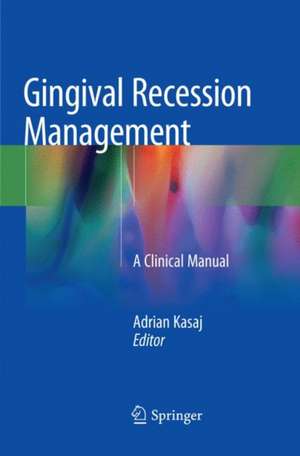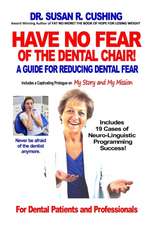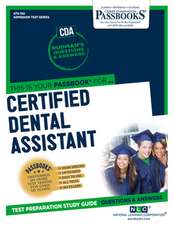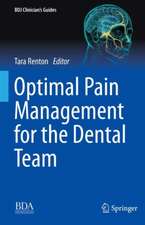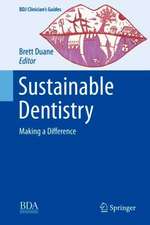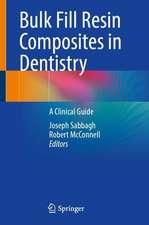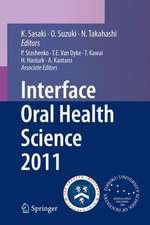Gingival Recession Management: A Clinical Manual
Editat de Adrian Kasajen Limba Engleză Paperback – 16 dec 2018
| Toate formatele și edițiile | Preț | Express |
|---|---|---|
| Paperback (1) | 697.13 lei 38-44 zile | |
| Springer International Publishing – 16 dec 2018 | 697.13 lei 38-44 zile | |
| Hardback (1) | 958.87 lei 38-44 zile | |
| Springer International Publishing – 16 aug 2018 | 958.87 lei 38-44 zile |
Preț: 697.13 lei
Preț vechi: 733.81 lei
-5% Nou
Puncte Express: 1046
Preț estimativ în valută:
133.39€ • 145.35$ • 112.41£
133.39€ • 145.35$ • 112.41£
Carte tipărită la comandă
Livrare economică 19-25 aprilie
Preluare comenzi: 021 569.72.76
Specificații
ISBN-13: 9783030099848
ISBN-10: 3030099849
Pagini: 157
Ilustrații: V, 157 p. 86 illus., 84 illus. in color.
Dimensiuni: 155 x 235 mm
Ediția:Softcover reprint of the original 1st ed. 2018
Editura: Springer International Publishing
Colecția Springer
Locul publicării:Cham, Switzerland
ISBN-10: 3030099849
Pagini: 157
Ilustrații: V, 157 p. 86 illus., 84 illus. in color.
Dimensiuni: 155 x 235 mm
Ediția:Softcover reprint of the original 1st ed. 2018
Editura: Springer International Publishing
Colecția Springer
Locul publicării:Cham, Switzerland
Cuprins
Definition of gingival recession.- Classification.-Etiology and prevalence.- Clinical examination and diagnosis.- Decision making in gingival recession treatment.- Surgical principles: Instruments, incisions, flaps and suturing techniques.- Recession coverage using autogenous grafts.- Recession coverage using soft tissue substitutes.- Complications.- Postsurgical care.
Notă biografică
Dr. Adrian Kasaj, DDS, MSc, PhD is a Professor of Periodontology in the Department of Operative Dentistry and Periodontology at the University Medical Center Mainz, Germany. In 2002 he received his Dr.med.dent degree from the University of Mainz and then continued postgraduate training in Periodontology (2002–2005) at the same university. He became a certified Specialist in Periodontology of the German Society of Periodontology (DGParo) in 2006 and also of the European Dental Association (EDA) in 2007. In 2009 he completed his PhD thesis (Habilitation) and was appointed as an Associate Professor. He became a Visiting Professor in the Department of Periodontology at Timisoara University, Romania in 2012. In 2014 he completed the post-graduate program “Master of Science in Oral Implantology” (German Society of Implantology/Steinbeis University) and in the same year was awarded the “Doctor honoris causa” (Dr.h.c.) degree by the University of Timisoara. In 2016 he was appointed as a Professor of Periodontology at Mainz University. He has published more than 100 original articles and reviews, lectures extensively in Germany and abroad, and serves on several editorial boards and advisory committees. Since 2014 he has also served as chairman of the “New Working Group in Periodontology” (NAgP). His research interests include the use of soft tissue substitutes in periodontal plastic surgery, local antimicrobial therapy, and use of biomaterials in regenerative periodontal therapy.
Textul de pe ultima copertă
This book is designed to serve as a clear and concise clinical manual that covers all aspects of the current management of gingival recession, with a particular focus on surgical techniques with the adjunctive use of autogenous tissues or soft tissue substitutes for recession coverage. A structured overview of the various surgical techniques is provided with the aid of high-quality illustrations, delivering an evidence-based clinical treatment guideline. In addition, individual chapters are dedicated to the classification of gingival recession, etiology and prevalence, clinical examination and diagnosis, decision making, potential complications, and postsurgical care. Gingival recession is a common condition in the adult population and is related to several undesirable conditions such as unaesthetic appearance, root caries, and hypersensitivity. Periodontal plastic surgery is now an important tool in the armamentarium of the clinician treating gingival recessions, and practitioners at all levels will find this book to be an invaluable source of guidance.
Caracteristici
Provides clinicians with an evidence-based and step-by-step treatment guideline Focuses on surgical techniques with adjunctive use of autogenous tissues or soft tissue substitutes Explains the management of complications and postsurgical care
